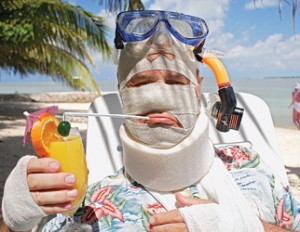Are you really covered?
Travel health insurance should never be a last-minute purchase. Making assumptions about a policy could end up costing you a small fortune.
Advertisement
Travel health insurance should never be a last-minute purchase. Making assumptions about a policy could end up costing you a small fortune.
 When Suzanne Simpson envisioned her honeymoon in Paris, lazy strolls along the Seine and Bordeaux-tippling evenings were to be the main events. Instead, she was the victim of a reckless driver and wound up spending three weeks in a critical-care hospital ward with a traumatic brain injury. More than a decade later, Simpson still suffers symptoms and has no memory of the accident. She can only go by her husband’s recollection of the incident: “It was pretty scary… Pretty scary expensive.”
Compounding the couple’s misfortune was the discovery that their travel health insurance coverage had not been filed properly. What ensued next for Simpson, who lives in Whitby, Ont., was a legal nightmare that took five years to resolve. After an estimated $100,000 in lawyers fees, a portion of her extensive foreign medical costs were finally repaid. The fact is, when it comes to purchasing travel health insurance (or using existing coverage through a credit card or work plan), the onus is largely on consumers to make sure they meet the requirements of policies. Consider the following tips carefully before your next trip because a bad health insurance purchase could cost you your life savings.
When Suzanne Simpson envisioned her honeymoon in Paris, lazy strolls along the Seine and Bordeaux-tippling evenings were to be the main events. Instead, she was the victim of a reckless driver and wound up spending three weeks in a critical-care hospital ward with a traumatic brain injury. More than a decade later, Simpson still suffers symptoms and has no memory of the accident. She can only go by her husband’s recollection of the incident: “It was pretty scary… Pretty scary expensive.”
Compounding the couple’s misfortune was the discovery that their travel health insurance coverage had not been filed properly. What ensued next for Simpson, who lives in Whitby, Ont., was a legal nightmare that took five years to resolve. After an estimated $100,000 in lawyers fees, a portion of her extensive foreign medical costs were finally repaid. The fact is, when it comes to purchasing travel health insurance (or using existing coverage through a credit card or work plan), the onus is largely on consumers to make sure they meet the requirements of policies. Consider the following tips carefully before your next trip because a bad health insurance purchase could cost you your life savings.
Share this article Share on Facebook Share on Twitter Share on Linkedin Share on Reddit Share on Email